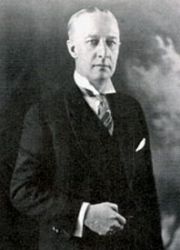Alfred E. Smith
From dKosopedia
Alfred Emanuel Smith (1873-1944) was the Democrat nominee for President of the United States in 1928. He was the first Catholic nominee for president of a major party.
Smith was born in New York City to a family of Irish Catholic teamsters, and was forced to grow up fast when his father died; the young Smith was only 14 years old when he was forced to drop out of his parochial school to support his family. Smith never went back to school. Instead, he got a job at the Fulton Fish Market, and it was here that he developed his political connection to the Tammany Hall machine. While Smith was supported by Tammany throughout his career, he remained largely untainted by the corruption that surrounded the machine.
Smith was elected to the New York Assembly in 1903, and served on the committee that investigated the infamous Triangle Shirtwaist Fire of 1911. He later became chair of the powerful Ways & Means Committee, and by 1912 had become Speaker. He had also become a leading voice in the Progressive movement, championing womens' sufferage, stronger regulation of corporations, and assistance to the poor.
Smith was elected Sheriff of Manhattan in 1915, and was elected governor of New York in 1918. Smith lost his re-election bid in the Republican sweep of 1920, but defeated Nathan Miller, his 1920 rival, in 1922, going on to be re-elected again in 1924 and 1926.
Smith was the candidate of the liberal wing of the Democratic party in the 1924 nominating convention, but at that time the nominee had to receive 2/3 of the delegate votes, and the Ku Klux Klan, a strong political force at the time, was completely opposed to the Catholic, anti-Prohibition Smith. The nomination went instead to John W. Davis.
Smith was nominated at the Democrats' 1928 convention in Houston, when William McAdoo, his principal rival for the nomination in 1924, declined to run. Perhaps to make his candidacy more palatable to the South, Smith selected Arkansas Sen. Joseph Robinson as his running mate. The Smith/Robinson platform criticized the Coolidge administration for doing nothing to alleviate economic pressure on small farmers and low-wage workers, failure to provide cheap electricity to rural areas, and for ignoring the needs of the urban poor.
The resulting campaign was savage, divisive, and often outright cruel. While Smith picked up the endorsement of the remains of Robert LaFollette's Progressive Party, which helped him among union workers and liberals, Smith was viciously attacked by the Ku Klux Klan and other anti-Catholic groups in pamphlets and speeches that described him as the puppet of the Pope, a licentious drunk, and worse. In the South, the Democrats suffered massive defections to Herbert Hoover, as many Southerners could not stomach a "wet" Catholic, even if he was a Democrat. In fact, the term Yellow dog Democrat comes from the 1928 campaign (it was a derisive name for the pro-Smith faction of the Alabama Democrats who declared that they would rather vote for a yellow dog than vote Republican). The Yellow Dogs managed to outdo their rivals in fiercely anti-GOP South Carolina, Georgia, and Alabama, while the presence of Robinson on the ticket and strong support of Huey Long and Theodore Bilbo kept Mississippi, Arkansas, and Louisiana on the Democratic side, but all the outer southern states suffered enough defections to go Republican. But there was a silver lining; in the cities, Democrat numbers had skyrocketed, where they would remain for every election up to the present day. This reversal was enough to give Smith Massachusetts and Rhode Island, but with prosperity on the Republicans' side, it was not enough to give Smith a victory; he lost 58-40 in the popular vote, and 444 to 87 in the electoral college.
After his defeat, Smith briefely resumed his duties as governor of New York, having just helped to elect his hanpicked successor, Franklin D. Roosevelt to that position. Roosevelt's nomination at the 1932 convention over Smith seems to have struck a sore spot between the men that eventually grew into a nasty rivalry; Smith supported Alf Landon and every Republican thereafter against FDR.
Smith drifted increasingly toward moderate Republicanism in the 1940s, believing that the Democrats had become too fiercely anti-business. But Smith died in October, 1944, so he never had the chance to influence many politicians of note on this point. His rivalry with the popular FDR also seemed to have a negative effect on his political reputation, and most of his admirers seem to view this later period of his life with some distaste.

![[Main Page]](../../../../upload/banner-blue-135.jpg)